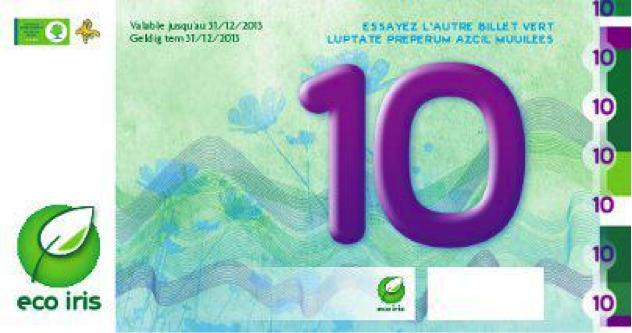Eco Iris
April 24, 2013
Contributor: Brussels (LP)
Workshop: Governance, synergies and local systems / Branding/label
Complementary currency to promote sustainable behaviours and consumption.

The motivation was to encourage citizens to adopt more environmentally friendly behaviours and make more sustainable consumer choices when shopping, including when purchasing food.
The idea was to go beyond raising awareness and providing information, but also providing an economic incentive
This was attempted through a pilot of a complementary currency “Eco iris” implemented in 2 Brussels neighbourhoods.
Participants can earn this alternative currency by demonstrating they have taken a variety of concrete actions including in relation with food, such as:
- purchasing organic fruit and vegetable baskets in participating shops,
- being a member of a GAS (solidarity purchase groups) to buy fruit and vegetables,
- grow their own fruit and vegetables,
- make their own compost,
- organise a sustainable neighbourhood meal…
In turn they can redeem the “Eco iris” they have earned in participating shops, including organic food stores and other neighbourhood stores or for certain services.
Benefits:
Environmentally, the scheme encourages the adoption of behaviours with lower impacts and shortens supply chains because participants shop in nearby stores.
Socially, because the project is rooted in neighbourhoods, and participants can jointly define the sustainable behaviours that should be rewarded, it strengthens social ties between citizens as well as with their neighbourhood stores.
Economically it provides an additional incentive and appreciation for activities and choices that are not usually valued in this way.
Pro and contra
The difficulty was to identify more sustainable shopping options for redeeming the “eco iris” points.
Options considered were to redeem the points only on certain products such as organic food or ecolabeled goods.
Another option considered was to only redeem them in stores that predominantly though not exclusively sell such products, such as organic food stores.
However, neither of these options was considered feasible. Preference was therefore given to “proximity” involving the various local stores of a neighbourhood.
This pilot project has received interests from over 600 citizens but managing it has been intensive in human resources. It may be necessary to reach a greater critical mass of participating stores to ensure that the eco iris points are not only earned but also used and circulated in the local economy to truly become a complementary currency.
How can we better point consumers towards local sustainable consumer choices?
Multicrieria ecolabelling schemes (such as the Brussels “Entreprise Ecodynamique scheme”) are effective but too burdensome for small stores to adopt and identifying specific sustainable products beyond the existing environmental labels is difficult for a city to do.
What simpler less resource efficient means could be used? E.g. identifying businesses that followed training to lessen their environmental impact or that have adopted an environmental charter?